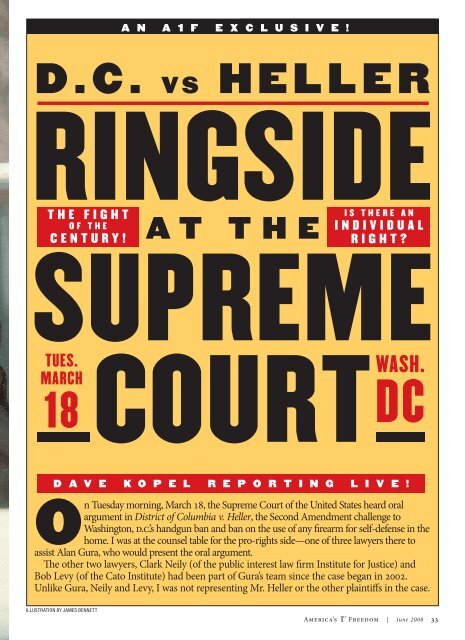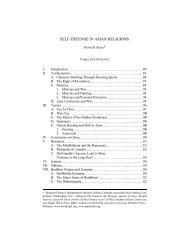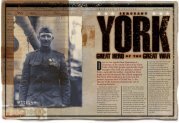Create successful ePaper yourself
Turn your PDF publications into a flip-book with our unique Google optimized e-Paper software.
A N A 1 F E X C L U S I V E !<br />
D.C. <strong>VS</strong> <strong>HELLER</strong><br />
RINGSIDE<br />
A T T H E<br />
SUPREME<br />
COURT<br />
THE FIGHT<br />
O F T H E<br />
CENTURY!<br />
TUES.<br />
MARCH<br />
18<br />
IS THERE AN<br />
I N D I V I D U A L<br />
RIGHT?<br />
WASH.<br />
DC<br />
D A V E K O P E L R E P O R T I N G L I V E !<br />
On Tuesday morning, March 18, the Supreme Court of the United States heard oral<br />
argument in District of Columbia v. Heller, the Second Amendment challenge to<br />
Washington, d.c.’s handgun ban and ban on the use of any firearm for self-defense in the<br />
home. I was at the counsel table for the pro-rights side—one of three lawyers there to<br />
assist Alan Gura, who would present the oral argument.<br />
The other two lawyers, Clark Neily (of the public interest law firm Institute for Justice) and<br />
Bob Levy (of the Cato Institute) had been part of Gura’s team since the case began in 2002.<br />
Unlike Gura, Neily and Levy, I was not representing Mr. Heller or the other plaintiffs in the case.<br />
IllustratIon by James bennett<br />
America’s 1 st<br />
Freedom | June 2008 33
D . C . V H E L L E R : A N A 1 F E X C L U S I V E !<br />
I had filed an amicus brief on behalf<br />
of a broad coalition of pro-Second<br />
Amendment police organizations and<br />
district attorneys. When Gura found<br />
out that there would be an extra seat at<br />
the counsel table for oral argument, he<br />
invited me to come along and help.<br />
Representing d.c. was Walter<br />
Dellinger, who had formerly served as<br />
acting solicitor general (the lead Supreme<br />
Court lawyer) in the Clinton administration.<br />
Dellinger had previously argued 29<br />
Supreme Court cases, while this would<br />
be Gura’s first Supreme Court argument.<br />
At exactly 10 a.m., the marshal of<br />
the court announced “Oyez, oyez, oyez,”<br />
and we rose as the justices entered<br />
the courtroom.<br />
Because d.c. had lost the case in<br />
the lower court, Dellinger argued first.<br />
He began by explaining d.c.’s theory of<br />
the Second Amendment—that it has<br />
no practical effect today, for it serves<br />
no purpose other than to protect state<br />
militias, like those of the founding<br />
era, from being disarmed by the federal<br />
government.<br />
Chief Justice John Roberts interjected:<br />
“If you’re right, Mr. Dellinger, it’s<br />
certainly an odd way to phrase the<br />
operative provision. If it is limited to<br />
state militias, why would they say ‘the<br />
right of the people’? In other words, why<br />
wouldn’t they say ‘state militias have the<br />
right to keep and bear arms’?”<br />
Dellinger replied that, to the<br />
Founders, “the militia” included all the<br />
people. Chief Justice Roberts noted that<br />
Dellinger’s point would imply that the<br />
right to arms belongs to all the people.<br />
Justice Anthony Kennedy suggested<br />
that the first clause of the Second<br />
Amendment simply reaffirms the<br />
importance of the militia, but does not<br />
narrow the operative clause. This is a<br />
point made in a grammatical sense in an<br />
amicus brief by George Mason University<br />
School of Law Professor Nelson Lund,<br />
and in a historical sense in the amicus<br />
brief by David Hardy on behalf of<br />
Academics for the Second Amendment.<br />
Shortly thereafter, Justice Kennedy<br />
expressed skepticism about Dellinger’s<br />
ultra-narrow reading of the right to<br />
arms: “It had nothing to do with the<br />
34 America’s 1 st<br />
Freedom | June 2008<br />
concern of the remote settler to defend<br />
himself and his family against hostile<br />
Indian tribes and outlaws, wolves and<br />
bears and grizzlies and things like that?”<br />
Justice Kennedy then followed his<br />
question with the following statement:<br />
“In my view,” the Second Amendment<br />
supplemented the congressional militia<br />
powers in Article i “by saying there’s a<br />
general right to bear arms quite without<br />
reference to the militia either way.”<br />
Justice John Paul Stevens had long<br />
“What is reasonable<br />
about a total<br />
bAN<br />
on possession?”<br />
asked Chief<br />
JustiCe roberts.<br />
made it clear, in his written opinions,<br />
that he loathed firearms. He pointed out<br />
that in the early state constitutions, only<br />
Pennsylvania and Vermont explicitly<br />
mentioned self-defense as a reason for<br />
the right to arms, whereas others, such<br />
as Massachusetts, mentioned only “the<br />
common defence.”<br />
Justice Stevens led Dellinger into a<br />
discussion of 18th century English judge<br />
and scholar William Blackstone and of<br />
the 1689 English Declaration of Rights,<br />
which Stevens (apparently following the<br />
lead of a brief written by Roger Williams<br />
Law School Professor Carl Bogus and<br />
Ohio State University historian Saul<br />
Cornell) claimed to be a “group right,”<br />
rather than an individual right.<br />
Justice Antonin Scalia noted that<br />
Dellinger’s claim that “bear arms”<br />
was an exclusively military term was<br />
inconsistent with British laws, which<br />
had forbidden Catholics and Scottish<br />
Highlanders to “bear arms.” Those laws<br />
banned gun possession in general, not<br />
merely membership in the militia.<br />
Perhaps recognizing that his<br />
anti-individual rights argument was<br />
weak, Dellinger shifted to a backup<br />
argument: The 42 state constitutions<br />
that recognize an individual right to<br />
arms have a “reasonableness” standard<br />
for gun controls, so d.c.’s handgun ban<br />
is reasonable.<br />
“What is reasonable about a total<br />
ban on possession?” asked Chief<br />
Justice Roberts.<br />
That only handguns are banned,<br />
while rifles and shotguns are still<br />
allowed, Dellinger answered.<br />
The Chief Justice shot back: “So<br />
if you have a law that prohibits the<br />
possession of books, it’s all right if you<br />
allow the possession of newspapers?”<br />
Most of the rest of Dellinger’s initial<br />
presentation was consumed by a long<br />
discussion about machine guns and<br />
“armor-piercing” bullets. Dellinger<br />
argued that the decision of the u.s.<br />
Court of Appeals for the d.c. Circuit<br />
(which declared last spring that the<br />
handgun ban violated the Second<br />
Amendment) meant that machine guns<br />
and “armor-piercing” ammo bans were<br />
unconstitutional. Chief Justice Roberts<br />
and Justice Scalia disagreed, contending<br />
that the lower court’s opinion was<br />
simply about a categorical handgun ban.<br />
Justice Samuel Alito then asked<br />
Dellinger about the d.c. trigger lock law,<br />
which requires all guns in the home<br />
to be locked at all times. Dellinger<br />
conceded that the law, if read literally,<br />
would be unreasonable, but he insisted<br />
that there was an implicit exception that<br />
allowed for self-defense.<br />
Next, Solicitor General Paul<br />
Clement, representing the u.s.<br />
Department of Justice, had 15 minutes<br />
to make his own argument. The brief<br />
that he filed in January explained at<br />
length that the Second Amendment was
an individual right. But it also argued<br />
that the Supreme Court should set an<br />
“intermediate scrutiny” standard of<br />
review for the Second Amendment,<br />
and remand the case back to the<br />
lower court to determine whether<br />
d.c.’s law meets this standard.<br />
Questions from Justice Ruth Bader<br />
Ginsberg suggested that she strongly<br />
endorses the government’s authority<br />
to ban particular types of guns. It was<br />
not clear if the bans she had in mind<br />
were only for machine guns or if she<br />
thought that a handgun ban would<br />
be constitutional.<br />
Justice Kennedy said that the test<br />
from the 1939 case United States v.<br />
Miller (focused on whether a gun<br />
has militia utility) was “insufficient”<br />
to address the Framers’ concerns<br />
“about guns being taken away from<br />
the people who needed them for<br />
their defense.”<br />
Justice Alito wondered how d.c.’s<br />
laws could survive any standard of<br />
review, since they ban the guns most<br />
commonly used for self-defense, and<br />
ban defensive use of all guns.<br />
Chief Justice Roberts said that,<br />
despite the solicitor general’s request<br />
to set an intermediate standard for<br />
judicial review of gun control laws,<br />
there was no need for the Supreme<br />
Court to articulate an intricate<br />
doctrine. (This view was set forth in<br />
the amicus brief authored on behalf<br />
of former u.s. Attorneys General<br />
Edwin Meese III and William Barr<br />
by former Department of Justice<br />
Office of Legal Counsel head Chuck<br />
Cooper.) This would allow the court<br />
to simply declare the handgun ban to<br />
be obviously unconstitutional.<br />
Now it was Gura’s turn. In a series<br />
of five moot courts (practice sessions<br />
for oral arguments) in the previous<br />
two weeks, Gura had been hammered<br />
mercilessly by expert lawyers playing<br />
the role of the Supreme Court justices.<br />
Before the actual Supreme Court,<br />
Gura’s presentation showed how<br />
well he had learned from the moots.<br />
He began by showing the key facts<br />
that would decide part of the case in<br />
our favor: contrary to the claims of<br />
Dellinger and Clement, there was no<br />
Continued on page 62
Ringside at D.C. v Heller<br />
from page 35<br />
implicit self-defense exception to the<br />
trigger lock law because banning selfdefense<br />
was the intent of the law.<br />
Gura pointed out that d.c. had so<br />
admitted, and the District of Columbia<br />
Court of Appeals had agreed, in the<br />
1977 case McIntosh v. Washington,<br />
where the nra had challenged d.c.’s<br />
then-new handgun and self-defense<br />
bans. Further, Gura explained, d.c.<br />
lawyers had formally acknowledged as<br />
an undisputed fact, when the trial court<br />
was hearing the Heller case, that the<br />
trigger lock law banned self-defense.<br />
Justice Stephen Breyer asked a<br />
lengthy question about whether, in light<br />
of the Second Amendment’s primary<br />
purpose of encouraging a citizen army,<br />
and in light of the statistics about<br />
handgun crime, the handgun ban is a<br />
“proportionate” law.<br />
Gura pointed to briefs from retired<br />
����������������<br />
generals and other officers (including<br />
nra Secretary Edward J. Land) that<br />
pointed out that the d.c. laws prevent<br />
District residents from acquiring civilian<br />
familiarity with firearms, and that<br />
research has shown that soldiers who<br />
are experienced with guns in civilian life<br />
make much better combat marksmen.<br />
Justice Breyer replied that d.c.<br />
residents can still use rifles at target<br />
ranges in Maryland or Virginia.<br />
Gura then pointed to the many<br />
federal court cases that recognized the<br />
militia utility of handguns.<br />
Justices Ginsberg and Souter propounded<br />
a series of challenging questions,<br />
while Justice Scalia stepped in to<br />
support Gura. Justice Kennedy returned<br />
to his “settler in the wilderness” imagery.<br />
Dellinger had reserved 10 minutes<br />
for rebuttal, and he used all the time<br />
in arguing for the reasonableness of<br />
the d.c. laws. Chief Justice Roberts<br />
expressed skepticism about a crime<br />
victim’s ability to remove a trigger lock<br />
and load a gun in the dark, in the few<br />
seconds after a criminal had broken<br />
into his or her home.<br />
d.c.’s law against carrying guns<br />
actually forbids a person who owns a legal<br />
handgun (a pre-1976 grandfathered one)<br />
from carrying the handgun from one<br />
room to another in his or her own<br />
home. Dellinger could only characterize<br />
the carry law as reasonable by<br />
misstating what it actually says.<br />
Although oral argument had been<br />
scheduled to take 75 minutes in total,<br />
overtime questions to all three of the<br />
lawyers had added an additional<br />
22 minutes—an unusual display of<br />
the Supreme Court’s keen interest in<br />
the subject.<br />
As I headed to the airport in the<br />
afternoon, my talkative cab driver asked<br />
what I had been doing in Washington.<br />
He was an immigrant from Eritrea,<br />
an east African nation that used to be<br />
part of Ethiopia. Before Eritrea won<br />
its independence, it was under the<br />
rule of the genocidal tyrant Mengistu,<br />
whom the cab driver described as an<br />
African Hitler. Yet the cabbie’s tribe, the<br />
Afars, had always been left alone by the<br />
government, he said, because everyone<br />
in the tribe had a rifle, and carried it<br />
wherever he went.<br />
The cab driver was disgusted with<br />
the d.c. law banning handguns and selfdefense<br />
in the home. He told me about<br />
his friend, an Ethiopian immigrant,<br />
who was a landlord. One day, the police<br />
raided a tenant’s apartment, suspecting<br />
the tenant was involved with drugs. The<br />
police also raided the landlord’s home,<br />
and found no drugs, but did find a gun<br />
that the landlord kept for self-defense.<br />
For a year and a half, the landlord<br />
was dragged through the d.c. courts<br />
until, finally, the prayers of his cab driver<br />
friend were answered: a kind-hearted<br />
judge put the landlord on probation,<br />
instead of sending him to jail.<br />
“The American Constitution is<br />
the greatest in the world,” the cabbie<br />
affirmed. “Every country should use it.<br />
The one thing that every American can<br />
give to his children and grandchildren<br />
is the American Constitution.”<br />
Two centuries separate James<br />
Madison from the Eritrean cab<br />
driver. Yet the two men are united<br />
in their passionate love of America’s<br />
constitutional liberty.<br />
After the recent oral arguments in the<br />
d.c. case, I am hopeful that the Supreme<br />
Court will fulfill the hopes of our revered<br />
Founders and of our newest patriotic<br />
citizens by affirming our individual<br />
Right to Keep and Bear Arms.




